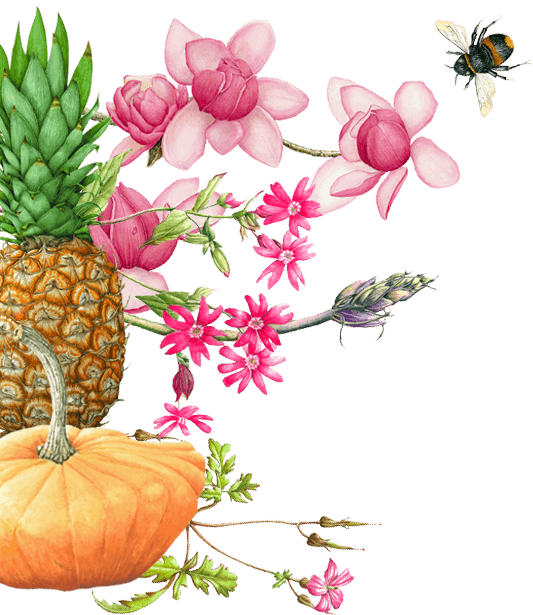The Lost Gardens are saved from being lost again by supporting a community food growing scheme
- 31st May 2020
As lockdown descended on the nation, the Lost Gardens of Heligan began to slip quietly back into a state of drowsy neglect. The gardeners were all furloughed and our gates were closed to visitors. Flowers still bloomed, of course. The lockdown had come right at the point of peak floral display in the gardens. The wet winter and warm, sunny spring primed the rhododendrons, magnolias and camellias to deliver what was undoubtedly one of the finest flowerings in recent times. Colour ran riot in the Pleasure Grounds and down through the Jungle. As the days passed, carpets of fallen flowers and leaves began to thicken along the empty paths and lawns. The garden was quiet but for bird song, the deep drone of bees…and the rooks. The rooks and their ragged conversations brought with them a melancholy air. For all its beauty and stillness, a garden void of people is a strange place.
The absence of people was most apparent in the Productive Garden. A vast, one hundred and fifty year old rhododendron will sail on regardless, with or without gardeners or visitors. The Productive Garden, on the other hand, needs people. It doesn’t function without them. The Kitchen Garden, the Melon Yard and the Flower Garden are places of constant work, consuming hours of husbandry, sweat and concentration. Seeds must be sown, seedlings pricked out, potted up, planted, watered and tended. With hoe, spade, fork and rake, the soil is worked too, nourished with manure and compost. Nothing here sails on regardless. Neglect is fatal. While the Pleasure Grounds and the Jungle felt empty, the Productive Garden felt abandoned.
In a time of hardship, Heligan’s Productive Garden being left unable to produce seemed like a crime. Here was a two acre horticultural machine, designed to produce food, lying idle. Here was a kitchen garden needing to be gardened with a supply of expert but furloughed gardeners ready to do the gardening. The search was on for local community projects to work with...
Enter Ken Radford, founder and leading light of People and Gardens. People and Gardens is a community interest company, based at Watering Lane, Pentewan. The purpose of P&G is to run a supported work project for people with learning disabilities and mental health issues, using horticulture as a medium to promote physical and emotional well-being. The aim is to teach work and social skills, to give people the opportunity to develop as individuals, and to enable them to take control over their own lives.
As part of this work, People and Gardens operates a fortnightly veg bag scheme, delivering to many vulnerable people in the St. Austell and surrounding areas. Following the outbreak of Covid 19, the nursery used by People and Gardens was closed and the staff put on furlough. A plan was developed for Heligan’s furloughed gardeners to become P&G volunteers and to grow vegetables for the veg bag scheme, using the Productive Garden at Heligan. Any surplus produce would be donated to vulnerable people in the local area. In the event of the lockdown ending, the season’s produce would remain ring-fenced for People and Garden’s veg bags.
There was no shortage of volunteers from the gardeners, allowing us to form two teams of five with each team working three days a week. The call for furlough had occurred at a crucial moment in the garden’s annual cycle. Hundreds of seedlings were just beginning to show themselves in glasshouses and young plants were coming on in cold frames. These had all been lost. In addition, to deliver sufficient quantities of produce for the veg bags, some adjustments to the usual varieties and practices had to be made.
The Productive Garden strives to adhere to a late Victorian / Edwardian model of a kitchen garden. Our heritage crops are all period correct, with the emphasis on variety rather than volume. This means we fill the garden with many different sorts of bean or cabbage rather than simply the ones that do best. People and Gardens need to fill eighty veg bags every fortnight so quantity as well as quality is key.
The result is that the Productive Garden is still looking wonderful but there are some changes to our usual strict rotations and cropping schedules. There are larger blocks of cabbages, more squashes with sweetcorn and pumpkins popping up where the cut-flowers used to grow. Behind the scenes, two polytunnels which are usually reserved for ornamental plants are now bursting with tomatoes and cucumbers in growbags. We’re growing herbs in pots and chillies for the veg bags too. At the same time, recipients of veg bags may be lucky enough to sample some of Heligan’s heritage potato collection, from stalwarts like Arran Victory to gourmet gems like Pink Fir Apple. For the lucky connoisseur, there’s even a bit of colour with some Shetland Black.
The volunteer gardeners have enjoyed the change to the routine, with a new approach to a very traditional garden. It has also been a source of pleasure to know that all the hard work will go directly to help members of the community. In fact, People and Gardens have been working with a local councillor to provide veg bags for twenty vulnerable households nearby. For all of us at Heligan there has been a poignant undertone to the past three months. 2020 marks thirty years since the Lost Gardens of Heligan were uncovered and the restoration begun. The pivotal moment in the gardens’ history, the beginning of their loss, was 1914. This was the year the gardeners left, the year they went to war, a war from which only a few returned. These weeks have been like a distant echo of the past. This forced absence has given us all time to pause and to reconsider values and priorities. Community, health and the natural world have reasserted themselves in our consciousness...





